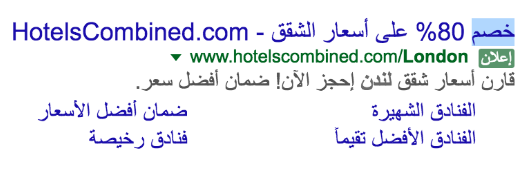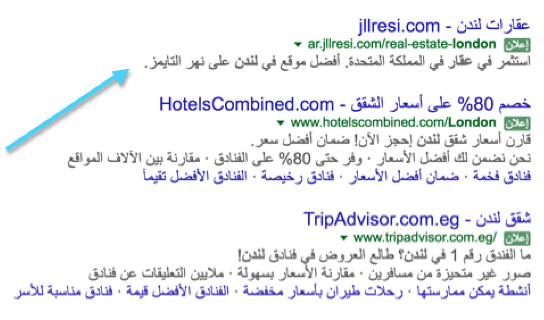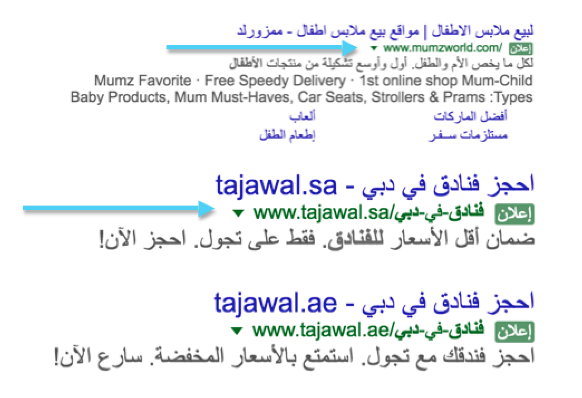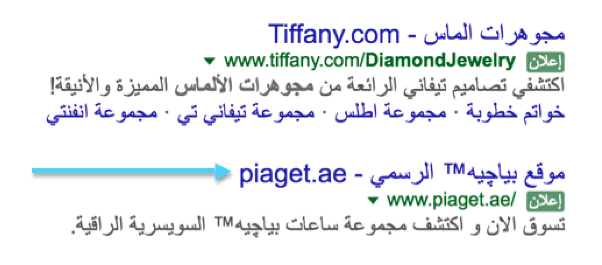Though the world of Arabic PPC is always expanding, many new ad campaigns fail to be effective due to several common mistakes. Any ad campaign run in Arabic needs to be optimized just as an English campaign needs to be optimized. We find many companies try to save money by outsourcing translation of ads or by having Arabic ads run by someone without experience running Arabic PPC campaigns. In most cases we’ve seen this ends up costing the company much more in wasted ad-spend, than the company saves from not hiring a professional to run the ads. We’ve literally seen companies waste tens of thousands of dollars on irreverent keywords and targeting in their ad campaigns in an effort to save a small amount on the management side of running ads.
We’ve compiled a list of some of the most frequent mistakes we see in Arabic PPC campaigns in the MENA region so you can avoid these pitfalls in your own efforts.
1. Using poorly written or nonexistent calls to action
When creating ads in Arabic, it’s important to utilize similar calls to action, like “buy,” “find,” or “shop.” Without these calls to action, the meaning of the ad can become unclear to the customer. For example, the ad below is for a company that finances Islamic real estate purchases, meaning they provide a specific kind of financing for Muslim customers. The ad was generated while searching for “عقارات لندن” (London real estate) and it advertises mortgage financing. However, the ad’s wording leaves the user without a call to action, opting to instead state the services offered. For a list of Arabic calls to action you should be using, see this article.
2. English usage in campaigns
In most campaigns run throughout the Arab region, targeting customers only in Arabic is going to leave a large potential customer base completely un-reached. Many Arabs are searching in their native language, and if a campaign only has ads written in English, it can alienate consumers. For certain high volume searches, such as those for iPhones, new computers, and other electronics, there is a significant lack of advertisements in Arabic. In fact, the majority of searches for electronics returned no Arabic ads, and only those in English, such as the one below:
This is a major opportunity for companies wishing to target the region to reach a base of potential customers their competitors aren’t accessing. A smart campaign will utilize both English and Arabic in order to target the broadest customer base, including natives and expatriates.
Another common issue is when ads are run in English when the user is searching in Arabic, like the campaign below, which displayed for the search
“عطلة في اوروبا”
If the user is searching in English, the results should display in English, but if the user is searching in Arabic, the majority of the ad text should also be in Arabic.
3. Poorly optimizing campaign keyword targeting
A lot of campaigns in the Arab region have poorly targeted keywords that generate irrelevant clicks. Thorough keyword research is necessary to ensure that what users search for is relevant to the ads running. Failing to do so means increased costs for the campaign and lower quality scores. The ad below appeared after searching for both the following keywords “شقق للبيع في لندن” and “ عقارات لندن”
Both searches are clearly targeted at purchasing real estate in London, but this ad is for hotels in London. This ad benefits neither the company, nor the user, since it is irrelevant to the user’s search, and unlikely to generate any conversions for the business.
4. Not using add extensions
One of the most common pitfalls of PPC advertising throughout the Arab world is failing to use ad extensions. It is recommended for most campaigns to use ad extensions to bulk up ads and create visually attractive enticements for the user. Ads with more extensions tend to look more authoritative than those without, and can be the difference between a customer converting through your campaign, or that of the competition. In the example below, there are two ads using ad extensions, and one without. The ad without the extensions looks far less professional and respectable than the ads with supplementary text and links. Ultimately, these ads tend to attract more clicks.
5. Poorly optimized destination page
Similarly to poorly targeted keywords, if the final destination page of the ad isn’t relevant to the user’s search, they’re not likely to click. Or, if a customer does click on the ad, and the landing page isn’t relevant to the ad’s content, the potential customer isn’t likely to convert. The URL of the landing page should be relevant, the landing page should have content that expands upon the text of the ad, and it should be the most relevant page on the site.
An example of a poorly optimized destination page turned up in a search for hotels in Washington, D.C, which displayed four different results. The first three all had URLs linking to pages for finding hotels and associated travel arrangements in Washington D.C, whereas the last link was simply to the homepage of the website. It’s more likely that a user will convert from one of the first three sites simply because the destination page specifically targets their search.
6. Underutilized display URL
The display URL is a valuable tool that searchers can use to identify the purpose of the landing page. If this URL is irrelevant to their search or to the ad itself, users will be less likely to click. Similarly, if the URL is misleading the user as to the content of the end page, the user will click, but the chances of conversion are greatly limited. In the case of the ad below, the ad was shown while searching for “ملابس اطفال” and the display URL is only for the main page of the site, which sells a variety of items related to babies and children. A better display URL would have included a pertinent keyword.
7. Poorly written headlines
Any time a customer reads the headline of an ad, it should be engaging and relevant to their search. If it’s poorly written, has grammatical mistakes, or fails to clearly state its purpose, users will be less likely to click through, or to ultimately convert. For example, the two ads below resulted from a search for “مجوهرات الماس” (diamond jewelry) but the headline text of the second ad simply advertises the homepage of the company Piaget, whereas the first ad for Tiffany repeats the search keyword, reinforcing the relevance of the ad to the user’s query. The more closely the keyword wording of the ad resembles that of the search term, the more likely the potential customer is to believe that the ad will deliver the product they initially wanted when starting the search. As you can see, these Arabic PPC marketing mistakes aren’t just limited to small companies, we clearly see big brands making mistakes in Arabic too.
Jordan Boshers
Jordan Boshers is the Chief Digital Strategist at IstiZada, a digital agency that helps companies market to Arabs. He has 12+ years of experience running successful digital marketing campaigns in the Arab world. His insights into Arabic SEO helped him grow previously unknown websites to dominate Arabic niches on Google including growing one site from 0 to more than 2.5 million users monthly. Jordan has consulted for hundreds of companies including helping corporations like Amazon, Berlitz, and Exxon Mobil with their Arabic digital marketing. Learn more here or on LinkedIn.
View all posts by Jordan Boshers







